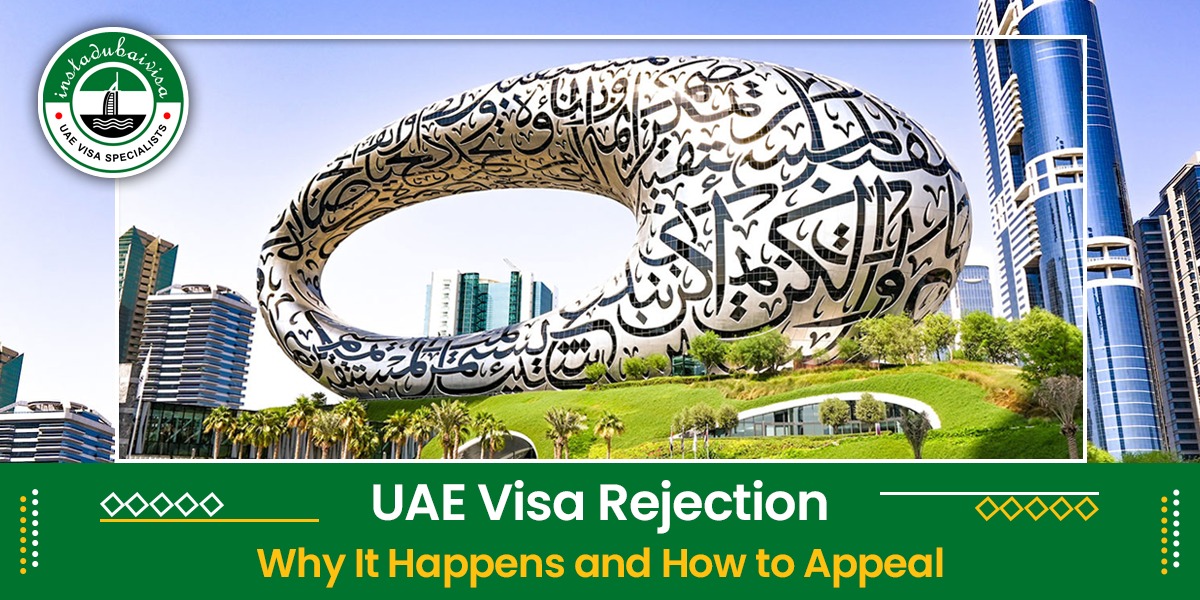I’ll never forget the sinking feeling I had when I read the words: “UAE visa application rejected.” I’d spent months planning my dream Dubai getaway—imagining the skyline views from Burj Khalifa, the charm of the Gold Souk, and quiet marina evenings. But instead of packing my bags, I was trying to make sense of a vague rejection notice, with no clear reason and a rapidly approaching travel date.
But here’s the good news: I did make it to Dubai—and if you’ve experienced something similar, you can too.
This guide breaks down the reasons why UAE visa rejections happen, how to prevent them, and how to confidently appeal if needed. Whether you're facing your first application or a second attempt, this information will get you back on track.
Why UAE Visa Rejections Happen
The UAE processes millions of visa applications each year, and while rejections can feel discouraging, they’re typically due to administrative issues—not personal ones. Here are the most common causes:
1. Incomplete or Incorrect Documents
A missing passport page, blurry photograph, or mismatched personal information across forms can lead to rejection.
Personal Note: I was once denied due to a low-quality passport scan—lesson learned.
2. Passport Validity Issues
If your passport has less than six months of validity from your intended travel date, your application won’t be considered.
3. Overstay History
Previous overstays—even brief ones—are logged and can impact future applications.
Example: A friend’s one-week overstay in 2019 resulted in a recent denial.
4. Criminal Record or Security Concerns
Past offenses or security flags, even minor, can lead to a denied application. Being upfront about your background helps if asked.
5. Sponsorship Problems
If a sponsor (family, friend, or company) fails to provide complete or updated documentation, your application may be affected.
6. Insufficient Financial Proof
Lack of evidence showing financial stability—like bank statements or sponsor letters—can raise red flags.
7. Application Mistakes
Incorrect travel dates, selecting the wrong visa type, or submitting an outdated form can all derail the process.
8. Policy Changes or Quotas
Occasionally, sudden updates or limitations based on nationality can influence decisions.
How to Avoid a Dubai Visa Rejection
Here’s how to ensure your next application goes smoothly:
-
Check Every Document: High-resolution passport scan, recent photograph, and correct personal details across all fields.
-
Update Your Passport: If it’s expiring in under six months, renew before applying.
-
Clear Past Records: Resolve fines or overstays via GDRFA or an embassy.
-
Choose the Right Visa Type: Match your travel purpose with the correct visa category.
-
Apply in Advance: Submit applications at least 10–14 days before your planned travel.
-
Use Reliable Sources: Apply through official portals like ICP or GDRFA, or through trusted partners such as InstaDubaiVisa.com.
-
Attach Financial Proof: Include recent bank statements or sponsorship letters to support your intent.
What to Do if Your UAE Visa Is Rejected
If you receive a rejection notice, don’t give up. Here’s what to do next:
Step 1: Review the Rejection Notice
Some notices give clues—others don’t. Either way, begin by reviewing your application details.
Step 2: Identify the Error
Check your passport’s validity, image quality, form accuracy, and any possible overstay issues.
Step 3: Correct the Problem
Once you know what went wrong, take corrective action:
-
Submit clear scans
-
Obtain missing documents
-
Clear any immigration records
Step 4: Choose Your Path
Option 1: Reapply
If the issue is minor or fixed:
-
Create a new application through Instadubaivisa.com
-
Upload updated documents
-
Track your submission—processing typically takes 2–5 working days
Step 5: Track and Follow Up
Monitor your appeal status online or through the app. In-person applicants should keep receipts. Most appeals are reviewed within 3–7 days.
Insider Tips for Successful Appeals
-
Act Quickly: File your appeal within a week of rejection.
-
Maintain Courtesy: A professional, polite tone works best.
-
Support Your Case: Include bank proof, hotel reservations, and itinerary.
-
Use Experts: Agencies like InstaDubaiVisa.com can liaise with immigration on your behalf.
-
Stay Updated: Policy changes can affect procedures—always verify with official portals.
Why Dubai Is Worth the Effort
Yes, the paperwork can be frustrating—but once you’re in Dubai, it all feels worth it:
-
Desert Experiences: Think BBQ dinners under starlit skies
-
Urban Luxury: Watch the Burj Khalifa light show or dine by the Dubai Fountain
-
Cultural Spots: Discover hidden gems like Al Fahidi and Alserkal Avenue
After my initial rejection, every moment in Dubai felt like a win.
FAQs: Dubai Visa Rejection & Appeal
How common is a Dubai visa rejection?
It’s not widespread, but documentation errors or past records increase the risk.
Can I appeal online?
Yes, through the ICP portal.
How long does an appeal take?
Typically 3–7 business days, sometimes faster with follow-ups.
Does rejection affect future applications?
Not if the issue is resolved and future submissions are accurate.
Can agencies guarantee approval?
No one can promise approval, but reliable agencies improve your odds significantly.
Final Thoughts: From Rejection to Approval
A UAE visa rejection isn’t the end of your travel story—it’s just a temporary detour. Fix the issue, follow the process, and don’t hesitate to get help when needed. With patience and persistence, you’ll soon be soaking in the views of Dubai’s skyline or strolling through its souks. Trust me—I’ve been there.



